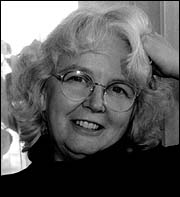![]()
Departments
![]()

|
Week of 17 October 1997 |
Vol. I, No. 8 |
Feature
Article
STH prof an expert on worship and music
Searching for a common chord
by Marion Sawey
School of Theology Assistant Professor Linda Clark is to be instrumental in helping Protestant congregations patch up often- bitter internal differences over the music used as part of their worship.
Lilly Endowment has awarded Clark a $268,000 grant to disseminate the findings of research she has done on church music and worship in the hope of allaying growing intracongregational strife. "Music is a crucial part of Protestant worship and a profound expression of a congregation's faith," says Clark. "Attempts to change the hymnal cause a furore because people have attached some of their deepest religious yearnings and understandings to music. It involves something much more profound than the intellect."
Clark discovered the close connection between music, faith, and religious identity in a three-year research project, also funded by Lilly, in which she studied three New England Methodist congregations, one suburban, one rural, and one urban and African-American.
"Although each congregation was involved in a similar religious project, the form it took was expressed in widely differing ways that reflected each congregation's culture, and one way was not interchangeable with another," she says.
"There is conflict about styles of music and worship in congregations because these things are not incidental. They carry profound, often inarticulate, intimations of the inner life of the community and its values."
Discord within a congregation, then, over whether its music should be classical, pop, or jazz -- "analogous to whether the music of Elton John or Verdi should have been played at Princess Diana's funeral" -- is symptomatic of broader cultural differences that go to the roots of worshippers' feelings of self-identity, Clark maintains.
"It is a very complex, intriguing phenomenon that has intensified within the last 10 to 15 years," she says.
Clark attributes the upsurge in conflict to factors that include shifting demographic patterns, the changing nature of authority within the church, with many congregations feeling a new freedom to demand what they want in services, and the growing influence of African-American music in the form of jazz, spirituals, and rock and roll.
As her new project, she hopes to develop resources that will show bickering congregations the path to compromise. These resources will include a videotape dealing with multicultural issues that will feature contrasting scenes from the church services of the three congregations she examined, as well as a book of essays highlighting her research findings.
"We are going to create a resource in which the theological, liturgical, and aesthetic issues involved in music and worship are explained and illustrated," says Clark.
|
|
|
Linda Clark
|
"Of course there are no guarantees that this will solve every congregation's problem because some of these conflicts are very, very bitter. Styles of worship can be almost like homes to some churchgoers, and no one likes changing homes."
The new resources will be tested in a series of conferences and seminars to which pastors, church musicians, and church executives will be invited. Clark will be aided in the project by filmmaker James Ault, Methodist pastor and liturgical scholar Mark Stamm, and Joanne Swenson, a United Church of Christ pastor and theologian.
Clark, who joined the School of Theology in 1980, was appointed the James R. Houghton Scholar there in 1992. Houghton, a Boston musician linked to the School for the Arts and the School of Theology, left an endowment that provides in perpetuity for an expert in sacred music to be a full-time member of the STH faculty. Clark teaches courses in congregational studies, musical worship, and the practice of music ministry.
